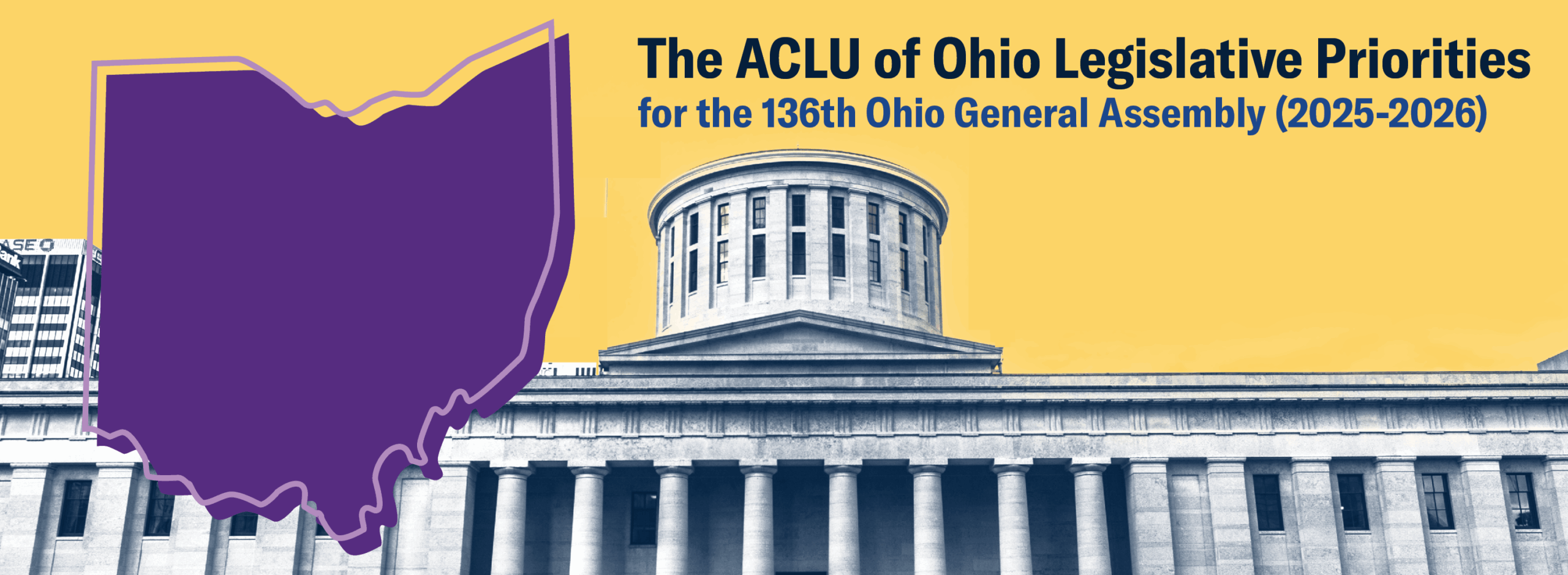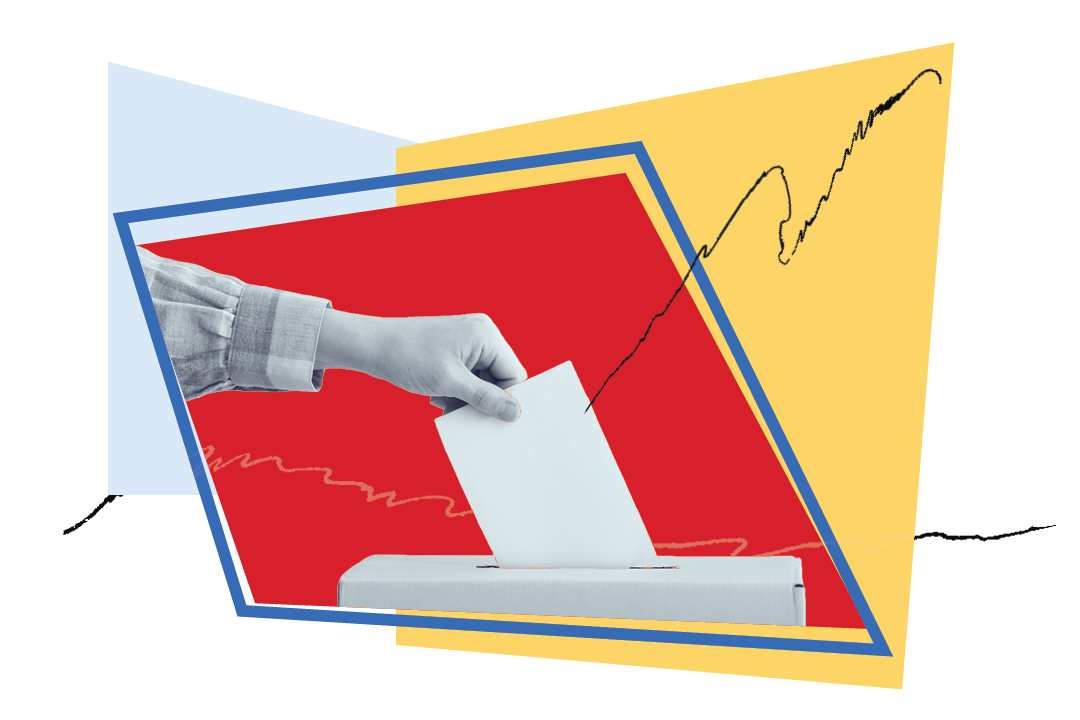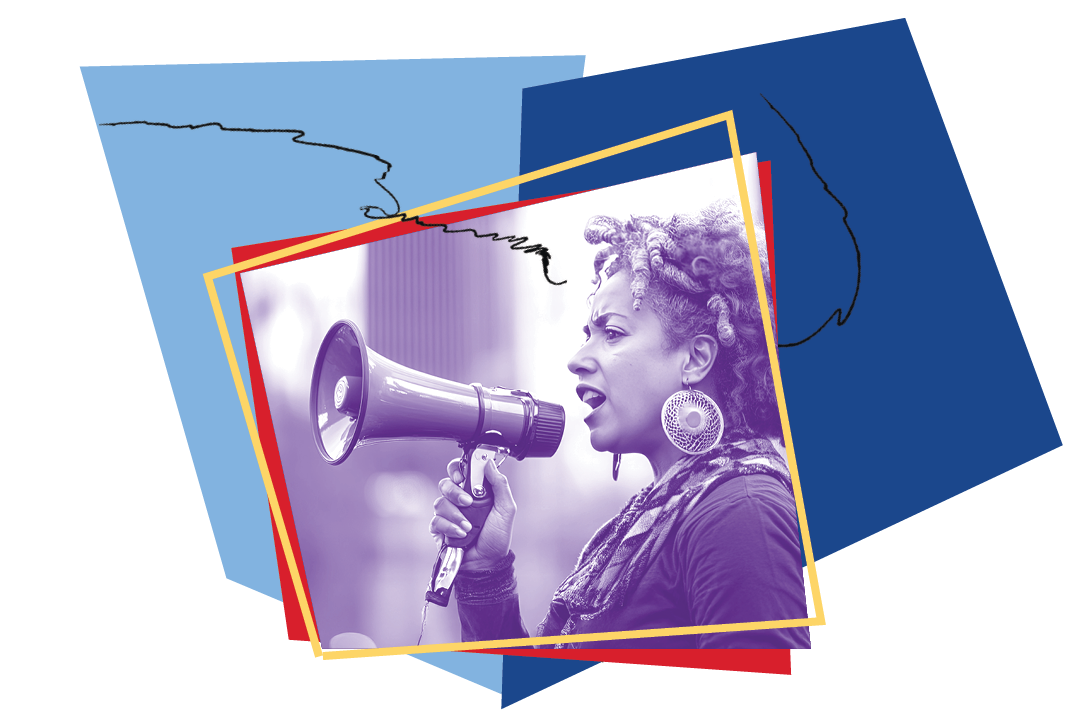Stand With Us On The Frontlines Of Freedom!
The ACLU protects the values enshrined in the Bill of Rights and the Constitution – fairness, equality, and a respect for individual rights. Join or renew your membership by clicking the JOIN NOW button. ACLU membership makes you a part of the national organization, the Ohio affiliate and local chapters where they exist.
Legislative Priorities TO DELETE

Engaged Democracy
Combatting Voter Suppression
(UP TO 150 characters here)
Coordinated attacks on voters and voting continue to increase with many efforts squarely aimed at marginalized communities and with negative impacts for all voters. This growing number of barriers suppresses voter turnout deliberately discouraging participation in our democratic process. The ACLU of Ohio continues its work on behalf of all voters, regardless of their party or ideology. We are also intentionally expanding our efforts to empower local communities and voters and collaborate with other organizations and groups. At the Statehouse, are concerns are:
- Ohio’s redistricting process, hijacked by those with no interest in fair legislative districts and who continue to pervert and ignore reforms overwhelmingly approved by Ohio voters.
- HB 233/SB 153 – Requires those registering to vote and updating their registration to prove their U.S. citizenship despite illegal voting proven to be extremely rare in Ohio. Obtaining proper documentation will be burdensome for many, including all those who changed their name when getting married.
- We also expect additional efforts to limit or eliminate early voting and mail-in voting.

Coordinated attacks on voters and voting continue to increase with many efforts squarely aimed at marginalized communities and with negative impacts for all voters. This growing number of barriers suppresses voter turnout deliberately discouraging participation in our democratic process. The ACLU of Ohio continues its work on behalf of all voters, regardless of their party or ideology. We are also intentionally expanding our efforts to empower local communities and voters and collaborate with other organizations and groups. At the Statehouse, are concerns are:
- Ohio’s redistricting process, hijacked by those with no interest in fair legislative districts and who continue to pervert and ignore reforms overwhelmingly approved by Ohio voters.
- HB 233/SB 153 – Requires those registering to vote and updating their registration to prove their U.S. citizenship despite illegal voting proven to be extremely rare in Ohio. Obtaining proper documentation will be burdensome for many, including all those who changed their name when getting married.
- We also expect additional efforts to limit or eliminate early voting and mail-in voting.
Individual Freedoms & Dignity
LGBTQ+ Rights
(UP TO 150 characters here)
The ACLU of Ohio advocates at the state and local level for proactive policies that protect and expand LGBTQ+ Ohioans’ civil rights and liberties
LGBTQ+ Rights
The ACLU of Ohio advocates at the state and local level for proactive policies that protect and expand LGBTQ+ Ohioans’ civil rights and liberties—fiercely fighting attacks on the rights of community members. Unfortunately, given our state legislature’s persistent focus on stripping away LGBTQ+ Ohioans’ rights, particularly for transgender Ohioans, we must devote much of our energy to defensive work. This General Assembly, lawmakers already tucked several anti-LGBTQ+ provisions into the state budget bill, two of which Gov. Mike DeWine vetoed. Should the legislature attempt to override those vetoes, we will be ready to fight back. Lawmakers also have introduced multiple standalone bills aimed at restricting LGBTQ+ rights which we oppose:
- HB 190, prohibiting K-12 faculty and school staff from using students' chosen names and pronouns, as well as their own.
- HB 245, banning drag in public spaces.

LGBTQ+ Rights
The ACLU of Ohio advocates at the state and local level for proactive policies that protect and expand LGBTQ+ Ohioans’ civil rights and liberties—fiercely fighting attacks on the rights of community members. Unfortunately, given our state legislature’s persistent focus on stripping away LGBTQ+ Ohioans’ rights, particularly for transgender Ohioans, we must devote much of our energy to defensive work. This General Assembly, lawmakers already tucked several anti-LGBTQ+ provisions into the state budget bill, two of which Gov. Mike DeWine vetoed. Should the legislature attempt to override those vetoes, we will be ready to fight back. Lawmakers also have introduced multiple standalone bills aimed at restricting LGBTQ+ rights which we oppose:
- HB 190, prohibiting K-12 faculty and school staff from using students' chosen names and pronouns, as well as their own.
- HB 245, banning drag in public spaces.
Smart Justice
Criminalization of Poverty, Death Penalty Repeal, Youth Justice, Privacy (UP TO 150 characters here)
The ACLU of Ohio works to deconstruct and prevent policies that punish our neighbors living in poverty.
Criminalization of Poverty
The ACLU of Ohio works to deconstruct and prevent policies that punish our neighbors living in poverty. These practices often trap people in cycles of debt, incarceration, and other entanglement with our criminal legal system that stand between the person and their ability to prosper. Such criminalization often takes the form of burdensome and costly court policies, money-driven pretrial practices, and long-term, legal impacts that prevent Ohioans from participating in their communities more fully. Instead, we dare to dream of an Ohio where our neighbors’ needs are met and, when they face the criminal legal system, have their rights respected on an achievable path to redemption and rights restoration. This session we are focusing on several positive bills, including:
- HB 296 – creating a 180-day grace period for the repayment of court fines and fees after incarceration.
- HB 393 – providing people with free state identification documents after incarceration from local correctional facilities.
- HB 160/SB 56 – protecting Ohioan’s right to adult-use cannabis without criminalization as well as other key provisions of Issue 2 (2023).
- Pretrial justice – pursuing evidence-based practices in our pretrial system, including but not limited to court date text message reminders.
- Clean slate legislation – creating a state-initiated record clearance process to facilitate the sealing and/or expungement of criminal records.
Death Penalty Repeal
The ACLU of Ohio long has supported abolishing our state’s death penalty since its reinstatement in 1981, on account of the risk of executing an innocent person (11 people have been exonerated from Ohio’s death row), its extreme cost (estimated at $1 to $3 million more expensive than life without parole cases), and its racial and geographic disparities, to name just a few irreparable flaws. This General Assembly features an unfortunate mixed bag of death penalty-related bills:
- HB 72 and SB 134, which the ACLU of Ohio staunchly opposes because they deceptively package repeal provisions with provisions that directly conflict with the Reproductive Freedom Amendment by attempting to limit funding for abortion access.
- SB 133, a “clean” death penalty repeal bill which the ACLU of Ohio fully supports.
- HB 36, which would take Ohio in the opposite direction by legalizing nitrogen gas suffocation as an execution method. The ACLU of Ohio opposes any efforts that double down on the failed status quo capital punishment represents.
Youth Justice
The ACLU of Ohio firmly believes all kids are kids and works diligently to affirm that through policy advocacy at state and local levels of the youth justice system. Young people who have found themselves involved with the youth justice system deserve the opportunity to change through dedicated rehabilitative means that do not focus on punishment, but instead on accountability and progress. We advocate for the end of mandatory youth bindover in the state, the elimination of mandatory gun specifications on youth sentencing, and for a Smaller is Safer model for Ohio’s youth detention that prioritizes diversion over confinement. We aim to listen to impacted voices in our processes, making sure they are respected and included in our advocacy.
Privacy
The ACLU works to protect and expand a broad right to privacy, increase control over one’s personal information, and ensure civil liberties are enhanced rather than compromised by technological innovation. We do not believe that Ohioans should have to choose between using new technologies and protecting their civil liberties.

Criminalization of Poverty
The ACLU of Ohio works to deconstruct and prevent policies that punish our neighbors living in poverty. These practices often trap people in cycles of debt, incarceration, and other entanglement with our criminal legal system that stand between the person and their ability to prosper. Such criminalization often takes the form of burdensome and costly court policies, money-driven pretrial practices, and long-term, legal impacts that prevent Ohioans from participating in their communities more fully. Instead, we dare to dream of an Ohio where our neighbors’ needs are met and, when they face the criminal legal system, have their rights respected on an achievable path to redemption and rights restoration. This session we are focusing on several positive bills, including:
- HB 296 – creating a 180-day grace period for the repayment of court fines and fees after incarceration.
- HB 393 – providing people with free state identification documents after incarceration from local correctional facilities.
- HB 160/SB 56 – protecting Ohioan’s right to adult-use cannabis without criminalization as well as other key provisions of Issue 2 (2023).
- Pretrial justice – pursuing evidence-based practices in our pretrial system, including but not limited to court date text message reminders.
- Clean slate legislation – creating a state-initiated record clearance process to facilitate the sealing and/or expungement of criminal records.
Death Penalty Repeal
The ACLU of Ohio long has supported abolishing our state’s death penalty since its reinstatement in 1981, on account of the risk of executing an innocent person (11 people have been exonerated from Ohio’s death row), its extreme cost (estimated at $1 to $3 million more expensive than life without parole cases), and its racial and geographic disparities, to name just a few irreparable flaws. This General Assembly features an unfortunate mixed bag of death penalty-related bills:
- HB 72 and SB 134, which the ACLU of Ohio staunchly opposes because they deceptively package repeal provisions with provisions that directly conflict with the Reproductive Freedom Amendment by attempting to limit funding for abortion access.
- SB 133, a “clean” death penalty repeal bill which the ACLU of Ohio fully supports.
- HB 36, which would take Ohio in the opposite direction by legalizing nitrogen gas suffocation as an execution method. The ACLU of Ohio opposes any efforts that double down on the failed status quo capital punishment represents.
Youth Justice
The ACLU of Ohio firmly believes all kids are kids and works diligently to affirm that through policy advocacy at state and local levels of the youth justice system. Young people who have found themselves involved with the youth justice system deserve the opportunity to change through dedicated rehabilitative means that do not focus on punishment, but instead on accountability and progress. We advocate for the end of mandatory youth bindover in the state, the elimination of mandatory gun specifications on youth sentencing, and for a Smaller is Safer model for Ohio’s youth detention that prioritizes diversion over confinement. We aim to listen to impacted voices in our processes, making sure they are respected and included in our advocacy.
Privacy
The ACLU works to protect and expand a broad right to privacy, increase control over one’s personal information, and ensure civil liberties are enhanced rather than compromised by technological innovation. We do not believe that Ohioans should have to choose between using new technologies and protecting their civil liberties.
Free Speech, Free Country
Free speech is the foundation of a free society, including speech some find unwelcome and unpopular. (UP TO 150 characters here)
Free Speech
Free speech is the foundation of a free society, including speech some find unwelcome and unpopular. The ACLU of Ohio maintains its commitment to the ability and right of all Ohioans to express themselves without fear their government will silence them for their opinions, thoughts, journalism, and art. The past several years, free speech has been an active topic at the Statehouse. Unfortunately, almost always with a goal to suppress speech. Bills currently being considered include:
- HB 90/SB 87 – equating criticism of any and all of Israel’s domestic and foreign policies and actions as “antisemitism” and in violation of Ohio’s civil rights laws.
- HB 249 – seeking to shut down and criminalize drag performances whenever there is a possibility even one minor may be exposed to what supporters deem indecency.
- HB 75/SB 202 – These bills legislate protections for “Thin Blue Line” flags and displays on private property governed by homeowners associations and landlords. However, these same bills leave unprotected speech that may be viewed as critical of law enforcement. Legislators must leave their fingers off the free speech scale and not pick and choose what is permitted or not.
Free Country
Everyone in the United States, regardless of their citizenship or immigration status, has a constitutional right to due process. That is, a formal opportunity to defend themselves and contest situations when the government seeks to punish or sanction them for their actions. The most prevalent example is defending one’s self in court against criminal charges via processes that put the burden on the government to prove allegations against those accused of wrongdoing. However, due process rights are increasingly under attack via immigration enforcement as many Ohio jails detain immigrants despite no legal authority to hold them, immigration authorities recklessly rush to deport people here legally, and the Trump administration banishes immigrants to countries notorious for human rights abuses. Several Ohio bills seek to fuel these actions, including expanding the role of local and state law enforcement to help enforce federal immigration enforcement responsibilities.
- HB 1/SB 88 – These bills outlaw the purchase of property in Ohio by people originally from countries considered a “threat” to the United States no matter how long they have been in Ohio or the U.S. and despite no record or individual accusations of wrongdoing.
- HB 26, HB 200, SB 172 – To varying degrees, these bills require Ohio law enforcement to partner with and enforce some aspects of federal immigration laws. Lack of funding, inadequate training, and racial profiling concerns are only some of our concerns about these bills.

Free Speech
Free speech is the foundation of a free society, including speech some find unwelcome and unpopular. The ACLU of Ohio maintains its commitment to the ability and right of all Ohioans to express themselves without fear their government will silence them for their opinions, thoughts, journalism, and art. The past several years, free speech has been an active topic at the Statehouse. Unfortunately, almost always with a goal to suppress speech. Bills currently being considered include:
- HB 90/SB 87 – equating criticism of any and all of Israel’s domestic and foreign policies and actions as “antisemitism” and in violation of Ohio’s civil rights laws.
- HB 249 – seeking to shut down and criminalize drag performances whenever there is a possibility even one minor may be exposed to what supporters deem indecency.
- HB 75/SB 202 – These bills legislate protections for “Thin Blue Line” flags and displays on private property governed by homeowners associations and landlords. However, these same bills leave unprotected speech that may be viewed as critical of law enforcement. Legislators must leave their fingers off the free speech scale and not pick and choose what is permitted or not.
Free Country
Everyone in the United States, regardless of their citizenship or immigration status, has a constitutional right to due process. That is, a formal opportunity to defend themselves and contest situations when the government seeks to punish or sanction them for their actions. The most prevalent example is defending one’s self in court against criminal charges via processes that put the burden on the government to prove allegations against those accused of wrongdoing. However, due process rights are increasingly under attack via immigration enforcement as many Ohio jails detain immigrants despite no legal authority to hold them, immigration authorities recklessly rush to deport people here legally, and the Trump administration banishes immigrants to countries notorious for human rights abuses. Several Ohio bills seek to fuel these actions, including expanding the role of local and state law enforcement to help enforce federal immigration enforcement responsibilities.
- HB 1/SB 88 – These bills outlaw the purchase of property in Ohio by people originally from countries considered a “threat” to the United States no matter how long they have been in Ohio or the U.S. and despite no record or individual accusations of wrongdoing.
- HB 26, HB 200, SB 172 – To varying degrees, these bills require Ohio law enforcement to partner with and enforce some aspects of federal immigration laws. Lack of funding, inadequate training, and racial profiling concerns are only some of our concerns about these bills.

Voting



